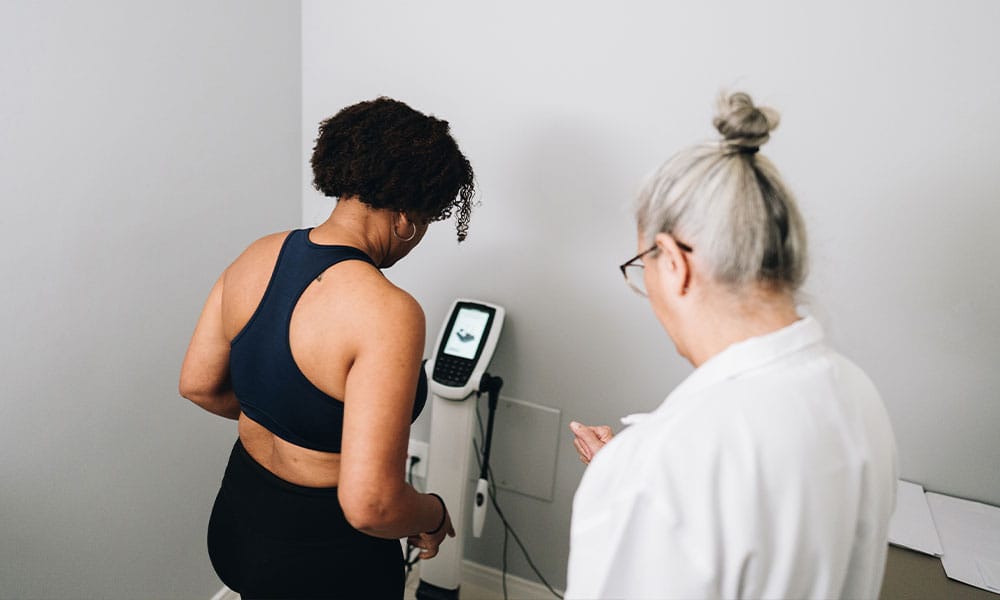For many patients, stepping onto the scale at the beginning of a medical visit can induce deep anxiety. What seems like a standard clinical task can trigger discomfort, fear, or even avoidance of care altogether. This reaction, known as “weigh-in,” can undermine trust, reduce adherence to care plans, and negatively affect the patients’ health outcomes.
At NJ Advanced Surgical Solutions in New Jersey, we recognize that weight measurement is a necessary component of effective patient care, but understanding the emotional challenges it may bring for some patients is just as crucial. This article explores what “weigh-in” anxiety is, why it occurs, and how providers can address it while still delivering optimal care.
What is ‘weigh-in’ anxiety?
“Weigh-in” anxiety refers to the stress, discomfort, or apprehension patients feel about being weighed during a medical appointment. While it may seem minor to some individuals, research indicates that for many individuals, this practice is emotionally charged and can even serve as a barrier to care. Patients with overweight or obesity, in particular, often associate the scale with stigma, judgment, or past negative encounters in clinical settings.
This anxiety is not only about the number itself but also about what it symbolizes: judgment or even failure. While weight is an essential metric in medicine, how it is approached can significantly shape the patient’s trust and willingness to engage in care.
What causes ‘weigh-in’ anxiety?
The reasons behind weigh-in anxiety are multifactorial and tied to both individual experience and cultural perceptions of weight. At its core, the problem arises when weighing is perceived less as a neutral health measure and more as a reflection of worth or willpower.
Several factors can contribute to the development of weigh-in anxiety, including:
- Previous experiences of stigma or shame during medical visits.
- Cultural pressures and societal weight bias that emphasize appearance over health.
- Fear of judgment from providers based on weight or body type.
- Association of weight with failure after multiple unsuccessful weight-loss attempts.
- Lack of privacy when weighing occurs in visible or public spaces.
- Language used by clinicians that may reinforce negative stereotypes.
Possible consequences of ‘weigh-in’ anxiety
If left unrecognized, weigh-in anxiety can have lasting consequences for patient health and the patient-provider relationship. Patients who feel judged because of their weight may choose to delay or avoid medical care, placing themselves at risk of more serious complications.
This phenomenon can manifest in several ways, such as:
- Avoidance of preventive screenings such as mammograms, Pap smears, or colonoscopies.
- Non-adherence to treatments due to fear of repeat weigh-ins or discussions about weight.
- Increased psychological distress that impacts self-esteem and overall well-being.
- Reduced trust in providers and disengagement from the healthcare system.
- Higher risk of unmanaged comorbidities like diabetes, cardiovascular disease, or sleep apnea.

How to mitigate ‘weigh-in’ anxiety
Acknowledging ‘weigh-in’ anxiety is the first step in improving patient care. Healthcare providers who create a respectful, inclusive environment not only reduce stigma but also foster stronger patient engagement and adherence. Several strategies can help minimize the emotional burden of weight measurement while maintaining its clinical value.
Explain the clinical purpose of weight measurement
Patients are more likely to accept weigh-ins when they understand the rationale behind them. Providers can explain that weight is used to calculate medication dosing, monitor treatment effectiveness, or assess disease risk: not as a judgment of character. This transparency helps reframe the scale as a tool rather than a punishment.
Focus on health, not numbers
Instead of emphasizing weight alone, clinicians can broaden the conversation to include body composition, lab values, and functional health markers. Discussing various factors such as waist circumference, blood pressure, or metabolic health, in addition to weight, shifts the focus toward a more comprehensive view of patient well-being.
Use inclusive language and environment
Language matters. Neutral terms such as “weight management” instead of “weight loss” or “nutritious food choices” instead of “diet” can reduce the stigma of weight. Similarly, creating a private space for weigh-ins and providing gowns, chairs, and equipment that accommodate all body sizes helps patients feel respected and safe.
Practice compassionate communication
Providers should remain mindful of implicit biases and consciously adopt a patient-centered approach to care. Listening without judgment, showing empathy, and acknowledging patient struggles reframes the clinical encounter as a partnership. When patients feel heard and valued, they are more likely to discuss their health goals honestly.
While weigh-ins remain a necessary part of medical care, the way they are conducted can significantly influence patient experience and engagement. At NJ Advanced Surgical Solutions, we always offer compassionate, respectful clinical care to ensure that patients feel supported in every step of their health journey. Recognizing and addressing weigh-in anxiety can ultimately help foster trust and promote better long-term outcomes for patients. Contact us today to learn more!

